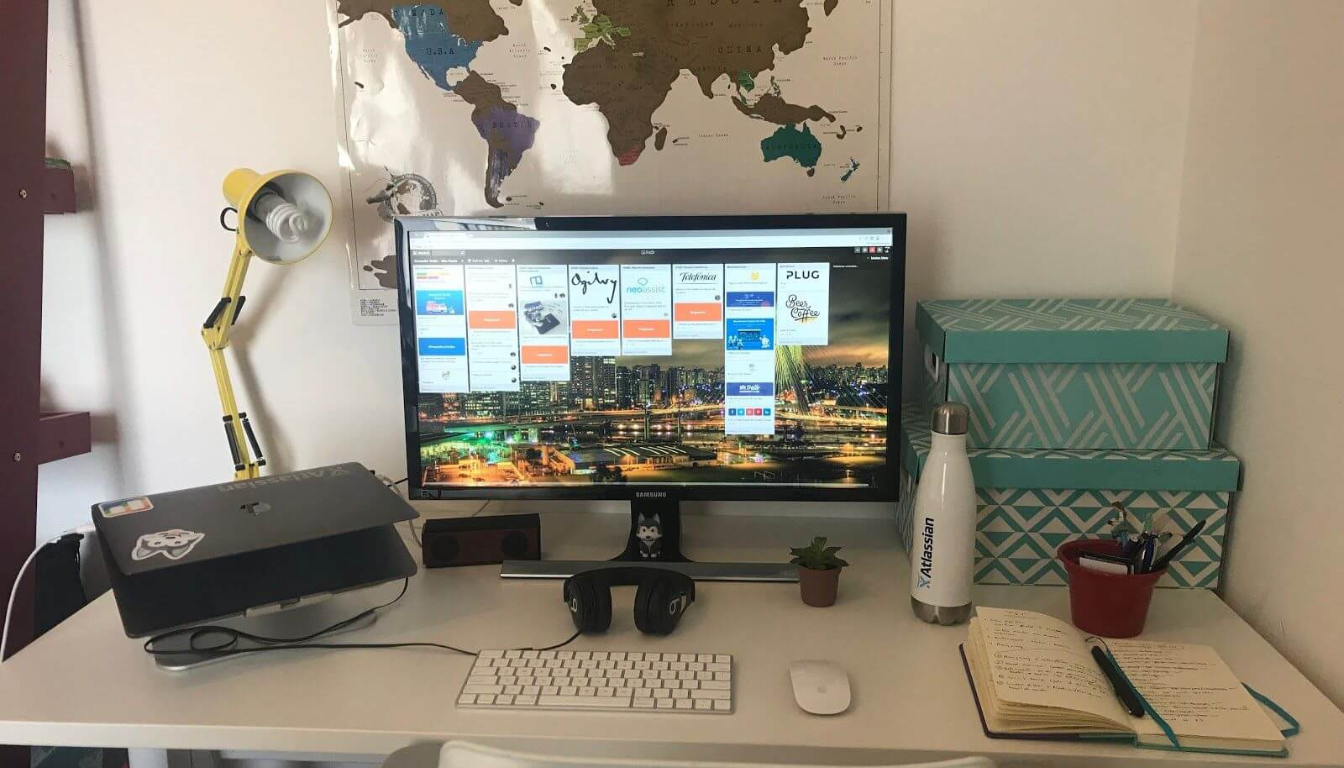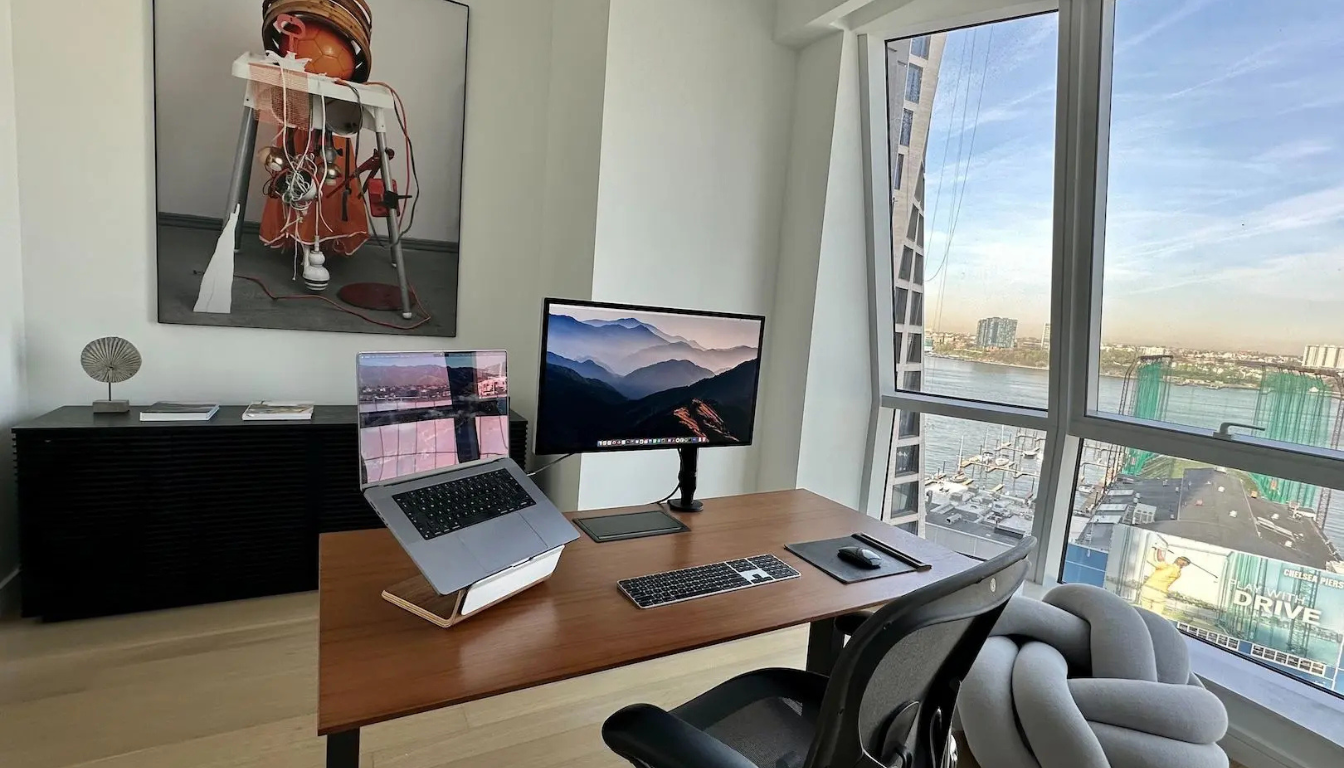How to Get Remote Job Quickly and Easily

Want to know how to get a remote job? This guide covers everything, from determining if remote work is right for you to preparing for remote interviews. Let’s get started on your path to a new remote career.
Key Takeaways
- Evaluate your fit for remote work by assessing lifestyle, motivation, and home office setup to enhance productivity.
- Identify ideal remote positions based on skills and preferences, and explore popular remote job titles in various industries.
- Tailor application materials and prepare for remote interviews to effectively showcase your qualifications and enthusiasm for remote work.
Evaluate Your Fit for Remote Work

Before embarking on your remote job search, it’s crucial to evaluate whether working remotely is a good fit for you. Assessing your fit for remote work requires consideration of key factors like lifestyle, personality, work ethic, self-motivation, time management, and home office setup. Being self-motivated and having a strong work ethic are crucial for succeeding in remote environments. Think about your current job satisfaction and whether commuting adds to your stress.
Self-reflection and research about your personal preferences and professional aspirations are necessary to ensure you choose the right remote job. Understanding the setup of your home office can play a significant role in your productivity and comfort while working remotely. Evaluating these aspects will better prepare you to thrive in a remote work environment.
Pros of Remote Jobs
One of the biggest advantages of remote jobs is the flexibility they offer. Flexibility is a top priority in today’s workforce, allowing individuals to tailor their work hours and locations to suit their needs. The absence of a daily commute can significantly enhance overall productivity and reduce stress levels. This flexibility enables remote workers to discover their productivity rhythms, working when they feel most efficient, thus improving work-life balance.
Working remotely also opens up a world of remote opportunities for the remote worker. You can find remote jobs that align with your skills and passions, regardless of geographical location. This broadens your job search and increases your chances of landing a great remote job. Additionally, many professionals choose to work remotely to enhance their work-life balance.
Moreover, remote job boards and listings provide access to a wide range of remote job opportunities, making it easier to find remote positions that are a perfect fit for you.
Cons of Remote Jobs
Before:
While remote jobs offer numerous benefits, they also come with their own set of challenges. Working remotely can lead to feelings of isolation as individuals may miss out on social interactions with colleagues. Remote workers often face distractions at home, which can disrupt their focus and productivity. Therefore, self-discipline and staying motivated are fundamental for thriving in remote work environments, enabling individuals to navigate challenges without direct supervision.
After incorporating the keyword:
The project was a success due to the hard work and dedication of the entire team.
While remote jobs offer numerous benefits, they also come with their own set of challenges:
- Feelings of isolation due to missing out on social interactions with colleagues.
- Distractions at home that can disrupt focus and productivity.
- The need for self-discipline and motivation to thrive in remote work environments.
These factors enable individuals to navigate challenges without direct supervision.
Effective time management is critical for remote workers to prioritize tasks and maintain productivity amidst potential distractions. Adaptability and flexibility are essential traits that allow remote employees to adjust to new situations and technologies seamlessly.
Understanding these cons helps you prepare to overcome remote work challenges and succeed in your job.
Identify Your Ideal Remote Position

Finding the right remote job starts with identifying your ideal remote position. Remote jobs can be fully remote or hybrid, offering flexibility in work environments. Understanding the difference between these types of remote positions can help you determine what works best for your lifestyle and preferences. Fully remote roles allow you to work entirely from home, while hybrid positions may require occasional in-office work.
Next, consider your skills, interests, and professional goals. Identifying the type of remote job that aligns with your expertise will increase your chances of finding a position that you enjoy and excel in. Whether you’re looking for a role in customer service, marketing, or technology, knowing your ideal remote position will help you focus your job search and find remote job opportunities that are the best fit for you.
Popular Remote Job Titles
There are several popular remote job titles that you can explore. Customer service representatives often handle inquiries and assistance remotely, making it a common entry-level remote position. Roles like market research analyst and financial adviser are also increasingly available in the remote job market. These positions offer opportunities to work from home while applying your skills in various industries.
Additionally, remote job titles such as software developer, virtual assistant, and digital marketing specialist are in high demand. These roles leverage digital tools and technologies, making them well-suited for remote work. Exploring remote job options can help you find positions that align with your skills and career aspirations.
Remote-Friendly Industries
Certain industries are particularly known for their abundance of remote job offerings. The technology sector is a leading field for remote job opportunities due to its reliance on digital tools. Remote occupations such as software engineer, project manager, and graphic designers are frequently available in remote job listings, including positions in web development.
The healthcare industry has also seen a rise in remote job openings, particularly in telehealth positions like nurse practitioners. Marketing is another prevalent industry offering remote roles, allowing for flexibility in campaign management and content creation.
Education has embraced remote work with online teaching and curriculum development positions. Additionally, business and financial operations roles are increasingly transitioning to remote settings due to digital advancement. Exploring these remote-friendly industries can help you find remote job opportunities that match your skills and interests.
Develop Remote Work Skills

To succeed in a remote job, developing essential remote work skills is crucial. Key skills for remote work include effective communication, self-motivation, and proficiency with digital collaboration tools. Developing these skills will help you navigate the unique challenges of remote work and excel in your remote position.
Seek opportunities to enhance your remote work skills by participating in online projects or using collaboration tools regularly. Practicing these skills prepares you to handle remote work demands and showcases your remote work experience to potential employers.
Essential Remote Work Tools
Proficiency in video conferencing software, such as Zoom or Microsoft Teams, is crucial for facilitating communication among remote team members. Effective remote collaboration relies on various categories of tools, including communication platforms, project management software, and file-sharing solutions. Familiarity with project management tools like Trello and Asana is vital for organizing and tracking tasks in remote work settings.
Project management tools help remote teams stay organized by allowing task assignment, tracking progress, and maintaining visibility across projects. Cloud-based file sharing tools enable remote employees to collaborate on documents from different locations and devices, enhancing teamwork.
Including a list of relevant technology skills can highlight your readiness for remote work.
Highlighting Remote Work Skills
Highlighting your remote work skills in resumes and cover letters demonstrates your preparedness for a remote work environment. Essential remote work skills include communication, self-motivation, proficiency with remote work tools, and time management. Clearly list relevant remote work skills in a specific section of your resume or incorporate them within your job descriptions.
In your cover letter, emphasize your remote work capabilities and experiences, relating them to the job requirements. This approach will help you stand out to remote hiring managers and increase your chances of securing a great remote job.
Search for Remote Job Opportunities

Finding remote job opportunities starts with knowing where to look. Utilizing specialized job boards can greatly streamline the process of finding remote positions. Recommended platforms for finding remote jobs include FlexJobs and niche job search platforms specializing in remote work. Understanding how to find a remote job helps in discovering remote job opportunities that are right for you.
Location requirements may vary; some jobs are fully remote, while others are hybrid. It’s important to understand that remote job application processes are not harder than traditional jobs, but a bit different. By knowing where to search and staying organized, you can easily find remote positions that match your skills and preferences.
Best Remote Job Boards
Remote job boards are valuable resources for job seekers looking for flexible working opportunities, offering curated job listings and various resources for application. WeWorkRemotely is the largest job board dedicated to remote jobs that offer remote jobs, attracting over 6 million visitors monthly, making it an excellent place to find diverse remote job listings.
FlexJobs is noted for its robust listings in technology and offers types of jobs like full-time, part-time, and freelance work. Remote.co posts jobs daily and is associated with FlexJobs, providing good quality job opportunities for remote work.
AngelList is a platform also geared towards start-ups, making it a great resource for remote positions within emerging companies. Utilizing recommended job boards like WeWorkRemotely, FlexJobs, and Remote.co enhances your chances of finding suitable remote job opportunities.
Networking for Remote Jobs
Leveraging your professional network can uncover hidden remote job opportunities that may not be advertised publicly. Personal connections can lead to exclusive job opportunities that aren’t advertised publicly. Reconnect with your network and specify the types of roles and industries you’re targeting to maximize your chances of finding remote work.
Networking through social media platforms and professional organizations can also help you find remote job opportunities. Maintaining and expanding your network increases your chances of being hired for a remote work that matches your skills and interests.
Avoiding Remote Job Scams
Remote job seekers should be cautious of job postings offering overly high salaries for minimal work requirements, as this can be a sign of a scam. Watch for vague job descriptions that lack specific details about responsibilities and expectations, indicating potential fraud.
Check if the company has a professional website and look for reviews or feedback from current or former employees to establish credibility. Verify the company through its social media presence and by looking for any recent news articles or mentions to confirm its existence and reputation.
Being vigilant and conducting thorough research help you avoid remote job scams, protect your well-being, and find legitimate opportunities.
Tailor Your Application Materials
Customizing your application materials can significantly enhance your chances of securing a remote job. Researching companies of interest helps determine fit, narrow down your list, and personalize applications. Your resume should be tailored specifically to remote companies to highlight your relevant experiences.
Incorporating keywords from the job description into your resume demonstrates attention to detail and helps pass applicant tracking systems. When applying for remote work, it’s crucial to demonstrate why you’re the best remote applicant.
Crafting a Remote-Specific Resume
Including specific examples of past remote work experiences in application materials can effectively demonstrate a candidate’s capability for remote roles. If you haven’t worked remotely before, highlight experiences such as collaborating with clients or managing projects across locations. Tailoring your resume to include specific remote work skills can significantly enhance your appeal to potential employers.
When applying for remote jobs, it’s crucial to highlight skills that demonstrate adaptability, such as experience with virtual collaboration and self-management. A section listing technology skills and remote-specific programs should be included in your resume to highlight remote work skills.
Showcasing soft skills like effective communication and time management on resumes can significantly enhance a candidate’s appeal to potential employers.
Writing an Effective Cover Letter
A strong cover letter should not only reference the job requirements but also convey genuine enthusiasm for the position. Tailor your cover letter to the specific role you are applying for by highlighting your relevant skills and experiences. Make sure to address the hiring manager directly and explain why you are passionate about working for their company.
In your cover letter, emphasize your remote work capabilities and experiences, relating them to the job requirements. This approach will help you stand out to hiring managers and increase your chances of securing the position. Providing specific examples of how you have successfully worked remotely in the past can further strengthen your cover letter.
Prepare for Remote Job Interviews

Preparing for remote job interviews is essential for making a positive impression on potential employers. Video or phone calls are commonly used for remote job positions. Ensure your interview space is quiet, well-lit, and free from distractions to create a professional environment. It’s also important to have a reliable internet connection to avoid any technical difficulties during the interview.
Be genuine and personal during your remote interview; avoid corporate speak to connect more effectively with the interviewer. Ask about the company’s dedication to remote work by inquiring about their systems for remote workers during the interview.
Familiarizing yourself with the technology that will be used can help you avoid any technical glitches and demonstrate your preparedness for remote work.
Setting Up Your Interview Space
To create a positive impression during your remote interview, prepare a tidy and professional space free from clutter. A well-lit area with minimal distractions contributes to a more effective remote interview environment. This setup will help you focus on the interview and present yourself in the best possible light.
Ensure that your interview space is comfortable and equipped with all the necessary tools, such as a computer with a webcam, a headset, and a stable internet connection. Setting up a professional interview space ensures you make a strong impression on potential employers.
Practicing Remote Interview Questions
Candidates should prepare for standard questions like ‘Tell me about yourself’ and ‘What are your strengths and weaknesses?’ during remote job interviews. Practicing answers using video conferencing tools helps candidates become familiar with the technology and reduces anxiety during real interviews. Simulating remote interviews with peers can provide valuable feedback and improve overall performance in actual interview scenarios.
Preparing for common interviewing questions is crucial to demonstrate your suitability for remote work. By practicing your responses and becoming comfortable with the technology, you can confidently showcase your skills and experience during the interview process.
Follow Up After Applications and Interviews
Following up after submitting applications and completing interviews demonstrates your interest and professionalism. Remote employers primarily look for trustworthy individuals and those passionate about their work. It is advisable to wait 7–10 days before following up after submitting your job application and to understand both the benefits and challenges. If you haven’t heard back, consider following up again a few weeks later.
A polite follow-up email can clarify your application status and demonstrate your enthusiasm for the role. Following up keeps your application top-of-mind for employers and increases your chances of landing the job.
Sending Thank-You Notes
A well-crafted thank-you note can differentiate you from other candidates and reinforce your interest in the position. A follow-up email should be concise, polite, and express continued interest in the position. Crafting a polite follow-up email can help you gain clarity on your application status and show your enthusiasm for the role.
Including a specific question about the hiring timeline can prompt a quicker response. Sending a thank-you note within 24 hours after an interview helps maintain a sense of urgency and interest.
Polite Inquiry Emails
Follow-up emails are crucial in demonstrating your continued interest in the position and helping to keep your application top-of-mind for employers. A thank-you email is typically more effective than a handwritten note due to faster delivery, allowing you to reinforce your candidacy promptly. It is important to send a thank-you note within 24 hours after an interview to maintain a sense of urgency and interest.
By sending polite inquiry emails, you show your professionalism and enthusiasm for the position. This can make a positive impression on hiring managers and increase your chances of securing the job.
Summary
In summary, finding a remote job quickly and easily requires a combination of self-assessment, skill development, and strategic job searching. By evaluating your fit for remote work, identifying your ideal remote position, and developing essential remote work skills, you can increase your chances of landing a great remote job. Companies like Offsite make remote job search easier by helping professionals discover legitimate opportunities through curated remote job boards, expert-vetted listings, and tailored job alerts. They also offer guidance on effective networking in remote work communities and tips to avoid common scams. Utilizing these tools alongside your own outreach can significantly increase your chances of landing a reliable remote position.
Tailoring your application materials and preparing for remote job interviews will help you stand out to potential employers. Following up after applications and interviews demonstrates your professionalism and continued interest in the position. With the right approach and preparation, you can successfully navigate the remote job market and find a remote job that aligns with your skills and lifestyle.
FAQs
- How can I determine if remote work is right for me?
To determine if remote work is right for you, evaluate your lifestyle, personality, work ethic, self-motivation, time management skills, and your home office setup. A thoughtful assessment of these factors will guide your decision effectively.
- What are some popular remote job titles?
Popular remote job titles are customer service representatives, software developers, financial advisers, virtual assistants, and digital marketing specialists. These roles reflect the growing demand for flexible work options across various industries.
- What industries offer the most remote job opportunities?
The technology, healthcare, education, marketing, and business and financial operations industries offer the most remote job opportunities. These sectors continue to expand their remote workforce, providing diverse career options.
- What should I include in my remote-specific resume?
Include your remote work experiences, strong communication skills, self-motivation, and proficiency with remote tools. Providing specific examples of your successful remote work will further strengthen your resume.
You may also like
Unique spaces for your next offsite
Find distinctive venues for your upcoming corporate retreat.
Stay Updated with Our Insights
Get exclusive content and valuable updates directly to you.







